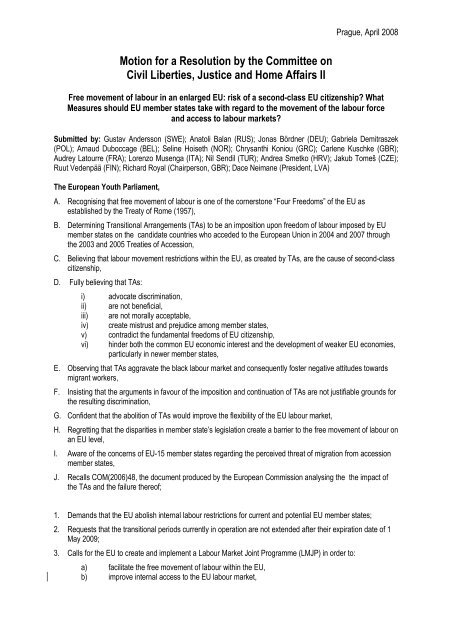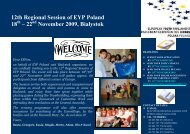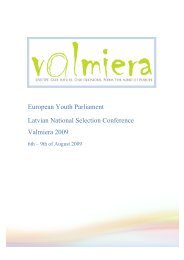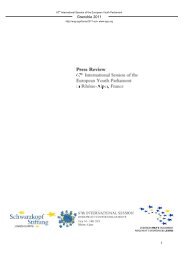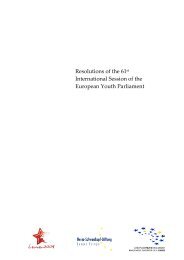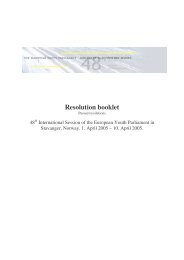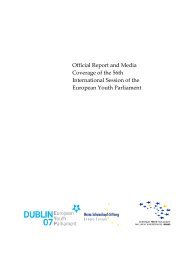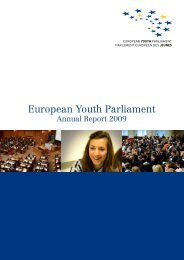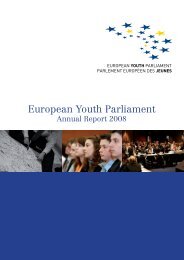Resolution - European Youth Parliament
Resolution - European Youth Parliament
Resolution - European Youth Parliament
Create successful ePaper yourself
Turn your PDF publications into a flip-book with our unique Google optimized e-Paper software.
Motion for a <strong>Resolution</strong> by the Committee on<br />
Civil Liberties, Justice and Home Affairs II<br />
Prague, April 2008<br />
Free movement of labour in an enlarged EU: risk of a second-class EU citizenship? What<br />
Measures should EU member states take with regard to the movement of the labour force<br />
and access to labour markets?<br />
Submitted by: Gustav Andersson (SWE); Anatoli Balan (RUS); Jonas Bördner (DEU); Gabriela Demitraszek<br />
(POL); Arnaud Duboccage (BEL); Seline Hoiseth (NOR); Chrysanthi Koniou (GRC); Carlene Kuschke (GBR);<br />
Audrey Latourre (FRA); Lorenzo Musenga (ITA); Nil Sendil (TUR); Andrea Smetko (HRV); Jakub Tomeš (CZE);<br />
Ruut Vedenpää (FIN); Richard Royal (Chairperson, GBR); Dace Neimane (President, LVA)<br />
The <strong>European</strong> <strong>Youth</strong> <strong>Parliament</strong>,<br />
A. Recognising that free movement of labour is one of the cornerstone “Four Freedoms” of the EU as<br />
established by the Treaty of Rome (1957),<br />
B. Determining Transitional Arrangements (TAs) to be an imposition upon freedom of labour imposed by EU<br />
member states on the candidate countries who acceded to the <strong>European</strong> Union in 2004 and 2007 through<br />
the 2003 and 2005 Treaties of Accession,<br />
C. Believing that labour movement restrictions within the EU, as created by TAs, are the cause of second-class<br />
citizenship,<br />
D. Fully believing that TAs:<br />
i) advocate discrimination,<br />
ii) are not beneficial,<br />
iii) are not morally acceptable,<br />
iv) create mistrust and prejudice among member states,<br />
v) contradict the fundamental freedoms of EU citizenship,<br />
vi) hinder both the common EU economic interest and the development of weaker EU economies,<br />
particularly in newer member states,<br />
E. Observing that TAs aggravate the black labour market and consequently foster negative attitudes towards<br />
migrant workers,<br />
F. Insisting that the arguments in favour of the imposition and continuation of TAs are not justifiable grounds for<br />
the resulting discrimination,<br />
G. Confident that the abolition of TAs would improve the flexibility of the EU labour market,<br />
H. Regretting that the disparities in member state’s legislation create a barrier to the free movement of labour on<br />
an EU level,<br />
I. Aware of the concerns of EU-15 member states regarding the perceived threat of migration from accession<br />
member states,<br />
J. Recalls COM(2006)48, the document produced by the <strong>European</strong> Commission analysing the the impact of<br />
the TAs and the failure thereof;<br />
1. Demands that the EU abolish internal labour restrictions for current and potential EU member states;<br />
2. Requests that the transitional periods currently in operation are not extended after their expiration date of 1<br />
May 2009;<br />
3. Calls for the EU to create and implement a Labour Market Joint Programme (LMJP) in order to:<br />
a) facilitate the free movement of labour within the EU,<br />
b) improve internal access to the EU labour market,


